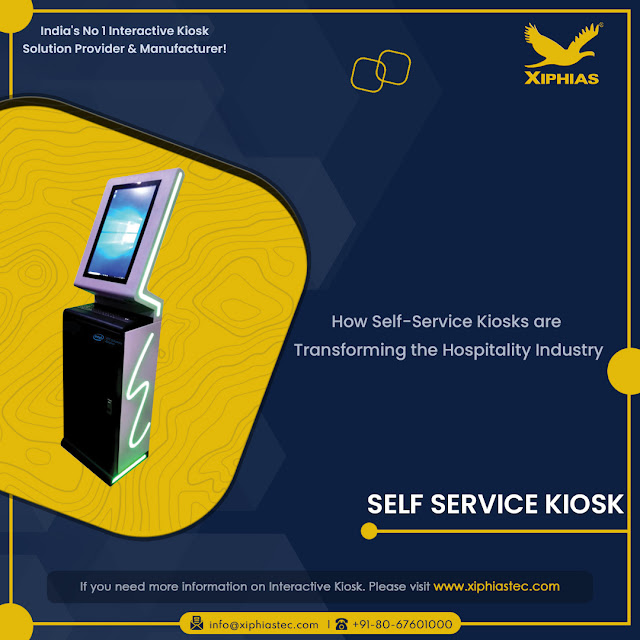How Self-Service Kiosks are Transforming the Hospitality Industry
In recent years, self-service kiosks have emerged as a game-changer in the hospitality industry. These user-friendly and efficient devices are revolutionizing the way businesses in the sector operate, enhancing customer experiences, streamlining operations, and boosting profitability. In this blog post, we will explore the various ways self-service kiosks are transforming the hospitality industry.
Improved Efficiency and Reduced Waiting Times
Self-service kiosks have significantly reduced customer waiting times, particularly in busy establishments such as hotels, restaurants, and airports. With self-service options, guests can bypass long queues at the front desk or ordering counters. They can easily check-in, place orders, or make reservations themselves, eliminating the need for manual processes and reducing bottlenecks. This improved efficiency not only enhances customer satisfaction but also allows staff to focus on more personalized interactions and critical tasks.
Enhanced Customer Experience and Personalization
Self-service kiosks empower guests to customize their experiences according to their preferences. Whether it's selecting room amenities, modifying food orders, or choosing seating options, customers have the freedom to personalize their interactions with the establishment. This level of control not only improves customer satisfaction but also fosters a sense of empowerment and engagement. Additionally, self-service kiosks often offer multilingual options, catering to a diverse range of guests and ensuring a seamless experience for international visitors.
Increased Upselling Opportunities
Self-service kiosks can act as effective sales tools by prompting customers with upselling suggestions. When guests are placing orders or making reservations through kiosks, the system can intelligently recommend additional items, upgrades, or add-ons based on their selections. This automated upselling capability boosts revenue generation for businesses while providing customers with valuable options they may not have considered initially. By leveraging self-service kiosks as persuasive selling tools, establishments can maximize their profitability.
Improved Order Accuracy and Decreased Errors
Order inaccuracies and mistakes can be costly for hospitality businesses, resulting in dissatisfied customers and wasted resources. Self-service kiosks help mitigate these issues by enabling customers to input their orders directly, reducing the chances of miscommunication or human errors. Guests can carefully review their selections on the screen before confirming, ensuring the accuracy of their orders. This not only enhances operational efficiency but also minimizes the need for manual order corrections and refunds.
Data Collection and Customer Insights
Self-service kiosks are valuable sources of data collection for hospitality businesses. By analyzing the data collected through these devices, establishments can gain valuable insights into customer preferences, purchasing patterns, and behavior. This data can then be used to refine marketing strategies, improve menu offerings, optimize operations, and provide more personalized experiences. By harnessing the power of data analytics, businesses can make data-driven decisions that drive growth and enhance customer satisfaction.
Cost Savings and Staff Optimization
Self-service kiosk implementation can help hospitality businesses save a lot of money. Businesses can lessen the need for overstaffing and redirect resources to more crucial areas by automating some processes. As basic chores are taken care of by self-service choices, staff employees can concentrate on offering outstanding customer service, handling special requests, and producing unforgettable experiences. Self-service kiosks also run continuously, eliminating the need for additional staff hours and lowering overall costs.
Conclusion:
Self-service kiosks are transforming the hospitality sector by providing higher efficiency, better client experiences, more potential for income generation, and cost savings. With the help of these simple tools, visitors may customize their encounters, shorten wait times, and take advantage of smooth transactions. Additionally, the useful information gathered by self-service kiosks enables organizations to understand client behavior and make data-driven decisions. Self-service kiosks are becoming an essential component of the hotel industry's transition as it continues to change, paving the way for a future that is more efficient and focused on the needs of the client.
👉 Contact us for Healthcare Kiosk



ReplyDeleteDragon Fruit Benefits is an excellent source of dietary fiber, both soluble and insoluble. Soluble fiber aids in maintaining healthy cholesterol levels and regulating blood sugar levels, while insoluble fiber promotes regular bowel movements and prevents constipation. Including dragon fruit in your diet can support a healthy digestive system and prevent digestive issues such as bloating and irritable bowel syndrome (IBS).
A heartwarming tale of beautiful boy, timothée Chalamet's depiction of Nic is equally remarkable. Chalamet's raw vulnerability captures the inner turmoil of an addict battling his demons. His performance is a rollercoaster of emotions, seamlessly transitioning from moments of fierce determination to heartbreaking vulnerability. The on-screen chemistry between Carell and Chalamet elevates the film's emotional resonance, lending authenticity to the portrayal of a complex and strained father-son relationship.
ReplyDeleteGreat post! Self-service kiosks are definitely shaking things up in the hospitality industry. If you're looking to take it a step further, integrating them with hospitality software development services could maximize efficiency and customer satisfaction even more.
ReplyDeleteSelf-service kiosks are truly revolutionizing the hospitality industry by improving efficiency and guest experience. It’s exciting to see how similar AI-driven solutions are impacting other sectors too—especially in healthcare. If you're looking to develop AI healthcare app solutions, the potential for automation and personalization is just as powerful.
ReplyDeleteIt’s rare that I enjoy erome every second, but I did here.
ReplyDeleteSelf-service kiosks don't just speed up the ordering process – they completely change the model of interaction with the customer. When such solutions are integrated with digital payments from a digital wallet developer businesses gain a new level of automation and personalization of service.
ReplyDelete